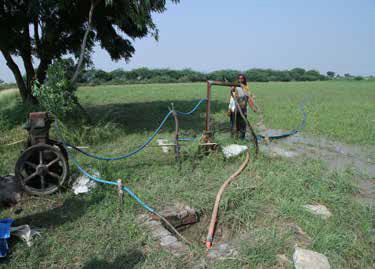
Description of the project: Erratic rain and irrigation scarcity contribute to food insecurity, financial losses and indebtedness for small farmers in India, especially in coastal areas. Bhungroo®, a locally developed rainwater management technology, saves farmers’ crops from waterlogging during monsoons and ensures adequate irrigation during dry seasons. The project relies on trained rural Women Climate Leaders (WCLs), who promote the technology and deliver fee-based agriculture expert advice. The co-ownership model has facilitated access to irrigation and farming facilities to smallholders, with each one ensuring food-security to 30-100 rural poor, and generating income of approximately USD $5700+ per year.
Climate impact: Gujarat State, India is prone to heavy flooding during monsoon and severe droughts the rest of year. Rainwater harvesting system Bhungroo®, supported by WCL services, brings back two harvests a year in areas that had become wastelands. The technology protects groundwater via a filtration system and increases soil fertility by reducing salinity, warding off desertification. With 30-year life-span, each unit conserves 1- 4 million liters of runoff water and saves 5-10 acres from water logging during wet seasons, while irrigates 22+ acres each winter.
Gender impact: Women form their own ownership groups, learning how to construct, install, and maintain Bhungroos and provide these services to other farmers. They adapt to climate change by being able to collect, store and distribute irrigation water as needed. This enables them to increase their revenue threefold. Becoming nutritionally and financially self-sufficient improves women farmers’ social status and helps them obtain formal land ownership, participate in village governance, and invest in the education of their children, including girls.
Scalability / replicability: Since 2011, over 3500 units of Bhungroo® have been constructed in 7 provinces of India as part of India’s rural development policy, but also in Bangladesh, Vietnam and Ghana. Replicability is ensured by the local sourcing of materials and the end users’ personal involvement in construction and maintenance. Expansion and up-scaling is based on the WCL model, where these first beneficiaries and users of Bhungroo have been trained and are now passing on their technical knowledge and understanding of climate adaptation.